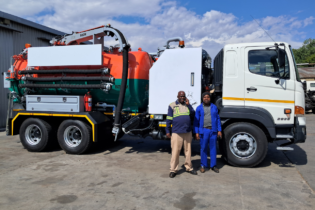At FTE Insight we want to support PETCO in educating consumers and strive to reduce the amount of post-consumer PET plastics ending up at landfill sites. We realise that one of PETCO’s biggest challenges is to develop sustainable markets for recycled PET – and we specialise in developing such products and markets,” says De Witt la Grange, whose company is a relative newcomer to the PET Recycling Company’s (PETCO’s) recycling partner fold.
FTE is a small but growing company, based in the Western Cape that manufactures corner pieces using recycled PET. These corner pieces are used to secure pallets and the corners of crates for the fruit packing industry, and are now in commercial production. PETCO will continue working with the company to grow this end-user base. Finding solutions “The recycled PET corner pieces provide a good end use for coloured PET bottles like brown, neon and solid colour bottles, which are currently not widely recycled in South Africa, as they are difficult to reuse and have limited end-use applications’ says Cheri Scholtz, CEO of PETCO. La Grange reveals more about why FTE chose to develop the corner pieces as first product to manufacture, explaining that the decision was based on the existing market, current role-players, material used for existing products, shortcomings on existing products and preference to work with recycled material. He says that at present, South African fruit exporters use mainly corner pieces made from carton.“Although carton is biodegradable, it also deteriorates when exposed to moisture. We experimented with different materials and decided to work with recycled PET. It is strong, durable and freely available,” says La Grange.
Future horizons FTE will not stop at one product and have already taken steps to expand their range. “We are in the final stages of developing poles for trellises and security fences. All these products are also made from recycled PET, and eventually we would like to be part of the solution for pallets made from recycled PET. “We completed the first phase of development and identified pallets as the main challenge in the logistics chain that needs to be addressed,” concludes La Grange.






